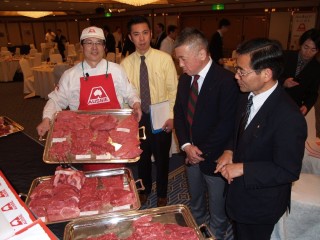 REACTION from the Japanese meat trade has been calm, following unsubstantiated claims made on Friday by a Japanese restaurant chain that an outbreak of E.coli that sickened 20 people may have been caused by contaminated Australian beef.
REACTION from the Japanese meat trade has been calm, following unsubstantiated claims made on Friday by a Japanese restaurant chain that an outbreak of E.coli that sickened 20 people may have been caused by contaminated Australian beef.
MLA Japan region manager Melanie Brock said on Saturday that the MLA Tokyo office had so far received nil calls from Japanese media, government, importers, distributors, wholesalers, or others trade participants in the wake of the May episode. The Australian Embassy in Tokyo reported a similar response.
The accusation that Australian beef might be the source of the illness was reported on only a handful of Japanese media channels on Friday (see earlier article, Concerns raised over Japanese e.coli incident). Since then, the matter has attracted little local Japanese media interest – unlike the response in Australia, where media coverage has been much more comprehensive.
Similarly, Australian exporters contacted on Saturday said they had received ‘no significant contact’ from Japanese trade partners expressing alarm or even mild concern over possible pathogen issues with Australian beef.
The Japanese meat trade has since issued statements supporting the integrity of Australian beef in the Japanese marketplace.
The initial statement made by representatives of the Gyukaku yakiniku barbecue restaurant chain at the heart of the food safety breakdown suggested that Australian beef may have been the source of the sickness episode, which saw 20 customers affected with mild food poisoning.
Since then, however, speculation in Japan has swung back to other potential sources of the contamination. One of these is preparation and handling issues in Japan, rather than the beef itself.
As yakiniku is a ‘communal’ cooking style, other attention in trade and broader industry and media circles has focussed on potential cross-contamination using the same chopsticks for handling the raw material going into the pot, as for eating the cooked product.
Other sources have suggested the pathogen may not be beef-related at all, but delivered through other ingredients in the yakiniku such as vegetables. Issues like these have been a subject of discussion on Twitter, used by an estimated 25 percent of the Japanese population.
It has not even yet been confirmed that the raw material involved in the episode was Australian, as the Gyukaku restaurant company uses beef from a variety of sources other than Australia.
Unfortunately, as often happens with such incidents, the initial speculation over Australian beef may do some lasting damage to our food safety reputation, even if it is proven beyond doubt that the contamination source is other than Australian beef in origin.
To put the e.coli episode into some context, pathogen-based sickness episodes are not that uncommon in Japan, from a wide variety of sources other than meat. The episodes are especially common during the warmer summer months.
A trade source also suggested the current difficult post-earthquake/tsunami period in Japan may be contributing to potential food safety breakdowns. Pressure exists on power-usage, with fines in place for corporations that do not make efforts to reduce electrical consumption. This has led to local speculation about potential compromise in some cold chains, as refrigeration units are turned-off. There is also a growing stockpile of beef in Japan at present, likely to reach 88,000 tonnes by end of June.
Public health authorities in Toyama prefecture, the location of the May incident, are undertaking a full investigation. Past history would suggest that any Japanese scrutiny into such events is likely to be thorough, but not necessarily swift, meaning it could be some days or even weeks before an outcome is known.
Impact on trade
MLA’s Melanie Brock is confident that the Japanese investigation will demonstrate exactly whether Australian beef was involved, and at what point in the chain any contamination might have occurred.
She said she did not anticipate any direct impact on Australian beef sales into Japan over the incident.
While it was possible that some consumers might avoid food service, and particularly yakiniku restaurants for a while, the food service sector in Japan was already struggling due to the economy and post-earthquake issues.
“However that might in fact lift demand through retail channels, for home consumption,” Ms Brock said.
While there was not yet a lot of evidence of that happening, one large chain with which MLA is working saw a 180 percent increase in turnover of Australian beef leading up to the Golden Week holiday period compared with last year, Ms Brock said.
"Australian beef still has a very strong reputation in Japan for high food safety and traceability standards," she said.



HAVE YOUR SAY